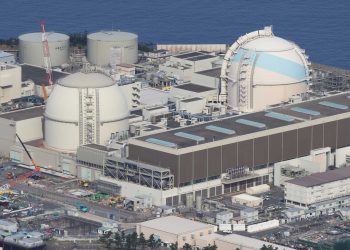,
Beijing (AFP): Israeli Prime Minister Ehud Olmert, midway through an official visit to Beijing, said Wednesday he received a candid assurance from China that it opposes Iran having a nuclear arsenal. Speaking to reporters accompanying him on his three-day visit, Olmert said he was “positively surprised by the things I heard” during a 90-minute meeting with Chinese Premier Wen Jiabao.
“China made it absolutely clear that it opposed an Iran with a nuclear bomb,” he added, although he refused to elaborate on the contents of his talks.
Olmert's remarks contrasted with Israeli expectations of a cold shoulder from Beijing over the Jewish state's call for tough sanctions to slam the brakes on Iran's nuclear ambitions.
As a veto-wielding permanent member of the UN Security Council, China is a pivotal player. But many observers suspect that its need for Iranian oil and gas to power its booming economy could soften its position.
Iran insists that its nuclear programme is entirely peaceful, but it has refused to bow to a UN demand to halt uranium enrichment work.
On Thursday Olmert will meet President Hu Jintao and attend a special concert marking 15 years of diplomatic ties between the countries before heading back to Israel.
During his talks Wednesday, Olmert discussed the implementation of the December 23 resolution by the Security Council — supported by China — that imposed limited sanctions on Iran, an Israeli official told AFP.
The Israeli leader stressed to Wen that the international community “must prepare for the next round of sanctions against Iran in the coming months,” the official added.
Before the meeting, Olmert was received by Wen at the Great Hall of the People where he reviewed an honour guard. He also spent part of the day at the Great Wall of China, outside the Chinese capital.
At the opening of the talks, Wen welcomed the Israeli leader and spoke of his “historical linkage” with China, referring to the sojourn to China of Olmert's ancestors who fled anti-Semitic persecution in Russia in the early 1900s.
Olmert said it was “a very exciting moment” for him and that “it is very important for Israel to have good, friendly and extensive relations” with China.
Besides the Iranian question, Olmert and Wen discussed at length bilateral economic ties.
They also signed agreements on promoting cultural ties, on protocols for the import of Israeli citrus fruit, and on water purification technology.
According to Olmert, the two sides also agreed to create a joint fund for research and development in different fields, including high technology, hydro-technology and pharmaceuticals.
Olmert, who met on Tuesday with the heads of some of China's largest companies, said the two sides had agreed to nearly triple trade volume by 2010 “from 3.6 billion dollars in 2006 to 10 billion dollars.”
He told reporters that the sensitive topic of Israeli arms sales to China “was never raised during my talks with the Chinese.” Nor was the Middle East conflict raised.
China angered Israel last year by hosting the Palestinian foreign minister Mahmud al-Zahar — a Hamas member — in defiance of a Western-led boycott of the Islamic militant group.
Israeli and Chinese diplomatic ties had been strained for several years after Israel was forced to scrap two deals to sell advanced military technology to China due to US pressure in 2000 and a second one in 2005.
Since then, officials told AFP that “Israel and the United States have reached an understanding over the issue of arms sales to China.”









